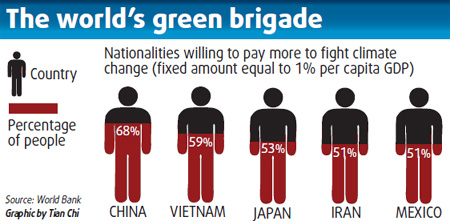Government and Policy
Chinese rise to the climate challenge
By Fu Jing (China Daily)
Updated: 2009-12-05 08:40
Almost seven in 10 Chinese are willing to pay a higher price for energy and other products to mitigate climate change, even though only about three in 10 think it is a "serious problem".
A World Bank poll that covered 15 nations, however, shows the majorities of the people, especially in the developing world, want their governments to take steps to fight global warming, even if that entails costs.
| ||||
Pollsters approached 1,010 people in nine provinces and municipalities of China, 68 percent of whom said they were willing to pay a fixed amount equal to 1 percent per capita GDP for energy and other products as part of taking steps to combat climate change. But only 28 percent considered global warming to be a "serious problem", though nearly half saw it as "somewhat serious".
Respondents in the US have slightly higher awareness than the Chinese, with 31 percent saying it was "very serious".
In contrast, about 90 percent of the respondents in Mexico and 85 percent in Bangladesh said it was a "very serious matter".
People said they would support public steps to limit greenhouse gas emissions and expedite adaptation measures. For example, they said they would support higher fuel efficiency standards for cars, preserving or expanding forests and extending funding to vulnerable countries so they could develop hardier crops suited to more severe climates.
"The poll's findings shed light on global attitudes at a particularly important moment: the run-up to the Copenhagen climate conference, which begins on Monday. Hearing from people in the developing world offers a new lens on this issue," said Katherine Sierra, World Bank vice-president for sustainable development.
Commissioned by the World Bank and conducted by WorldPublicOpinion.org, the poll questioned 13,518 people in 15 countries - Bangladesh, China, Egypt, France, India, Indonesia, Iran, Japan, Kenya, Mexico, Russia, Senegal, Turkey, the United States and Vietnam.

The findings were released two days before the UN climate conference in Copenhagen, where developing countries and the biggest historic emitters are expected to heatedly debate on a possible global carbon-governance treaty.
And they come just days after China announced it would cut carbon intensity - the amount of carbon dioxide emitted in production of one unit of GDP - by 40 to 45 percent by 2020 from the 2005 level.
Jing Yunchuan, chief lawyer with Beijing-based Gaotong Law Firm, said the survey showed a confusing picture of Chinese people's awareness about climate change. "They don't realize its seriousness, but they are ready to sacrifice."
Other key findings include:
Public concern over climate change is high worldwide, but it's generally higher in developing countries;
People, particularly in developing countries, believe climate change is already having negative effects;
and Support for increased adaptation funding to poor countries is widespread worldwide.











